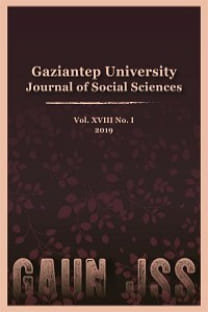J. Royce’un Sadakat Anlayışı ve Kötülüğün Üstesinden Gelebilmede Sadakatin Rolü
Kötülük, Kötümserlik, Sadakat, Evrensel Topluluk, Keder, Dava
The Understanding of Loyalty in J. Royce and The Role of Loyalty in Overcoming The Evil
- ISSN: 1303-0094
- Yayın Aralığı: 4
- Başlangıç: 1991
- Yayıncı: Gaziantep Üniv. Sosyal Bilimler Enst.
Ayntab Şehrinde Aile Birliğinin Sona Erme Süreci (1600–1650)
Destinasyon İmajı Oluşturmada Hüzün Turizmi: Afyonkarahisar ve Başkomutan Tarihi Milli Parkı
Sosyal Sermaye/Güven Boyutunda Etniklik
Bülent C. Tanrıtanır, Fırat YILDIZ
Göç ve Yoksulluk: Hakkâri Örneği
Mehmet Zeydin Yıldız, Faruk Alaeddinoğlu
Bourdieu’yü Okumak: Post-Pozitivist Bir Sosyolojinin İmkânı Üzerine
Asuman Çukur, Selahattin Kaynak, Tuba Direkçi, Mehmet Aygün, Süleyman İç, Cem Sayın, Selahattin Bekmez, Yusuf Demir, Tahsin Akçakanat, Ahmet Songur, Betül Duman, Osman Alacahan
Coğrafi Ortamın Şehirsel Mekân Adlarına Etkisi: Şanlıurfa Şehri Örneği
Veysi GÜNAL, M. Sait ŞAHİNALP, Abdulkadir GÜZEL
J. Royce’un Sadakat Anlayışı ve Kötülüğün Üstesinden Gelebilmede Sadakatin Rolü
